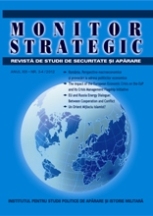Rolul Dialogului Mediteranean în consolidarea formulelor de parteneriat ale NATO. Consultare politică și interoperabilitate operațională
The Mediterranean Dialogue’s Role in the enhancement of NATO’s partnership formats. Political consulting and operational interoperability
Author(s): Dragoş ILINCASubject(s): Diplomatic history, Military history, Security and defense, Military policy, WW II and following years (1940 - 1949), Transformation Period (1990 - 2010)
Published by: Editura Militară
Keywords: NATO; Mediterranean Dialogue; Defence Capabilities Initiative; Interoperability Platform; Enhanced Opportunities Partners; Wales Summit; Warsaw Summit;
Summary/Abstract: More than two decades ago, at the beginning December 1994, NATO’s Foreign Ministers expressed their readiness to establish the Mediterranean Dialogue. It was meant to provide an institutionalized framework, underpinned by political cooperation and consultation on security aspects, especially in relations with the evolutions in the Southern neighborhood. Moreover, the decision was a clear expression of the NATO’s adaptation process started in the aftermath of the end of Cold War. Two months later, the first discussions took place between then NATO Secretary General Willy Claes and representatives of five countries from the North Africa and Middle East. Few years later the number of participating countries increased to seven thus encompassing Egypt, Israel, Mauritania, Morocco, Tunisia, Algeria and Jordan. Since its inception Mediterranean Dialogue evolved gradually from political consultation fora to a genuine cooperation and partnership platform, which contributed substantially to the structural development of NATO’s partnership policies. In addition to the strategic relevance of the political dialogue, the practical cooperation agenda developed under the aegis of Mediterranean Dialogue increased the overall profile and contribution of the countries from the region in the security management context. Many of them participated with forces and capabilities in several operational commitments conducted by NATO, especially those in Europe and Afghanistan. In the same vein, Mediterranean partners are one of the most active contributors in the overall context of counter-terrorism activities as well as in the framework of Global Coalition against ISIL.
Journal: Monitor Strategic
- Issue Year: 2018
- Issue No: 3-4
- Page Range: 21-29
- Page Count: 9
- Language: Romanian

